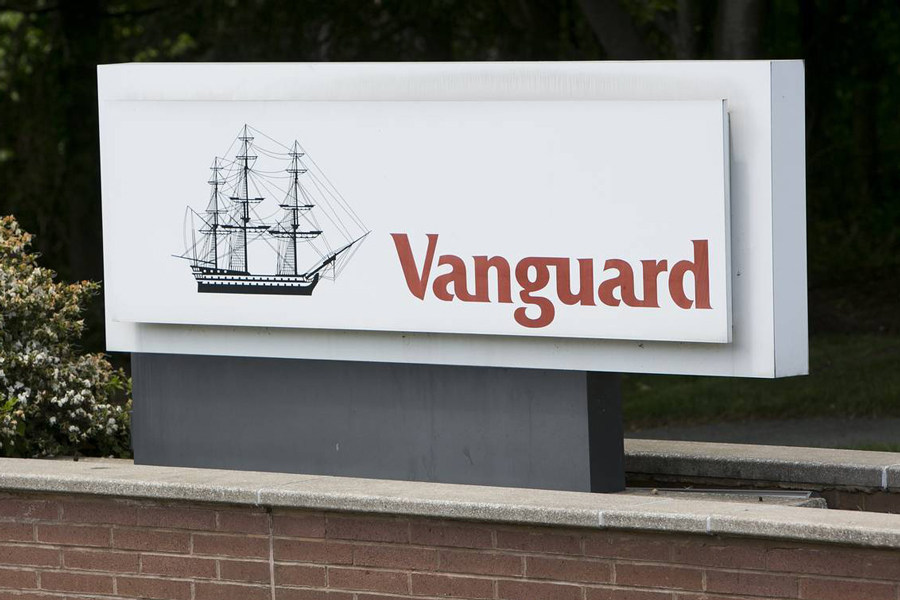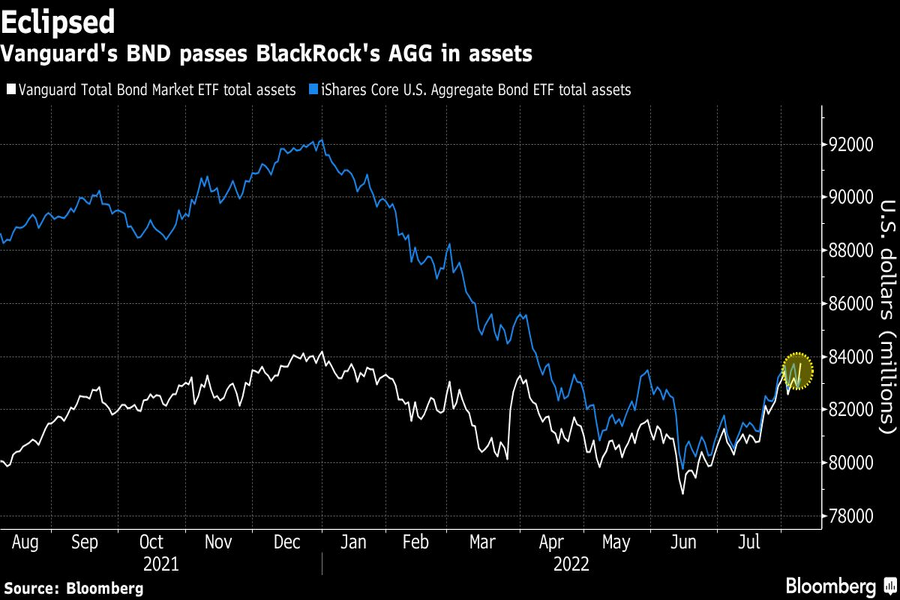

Vanguard Group has ushered in a new world order in the fixed-income exchange-traded fund arena.
The Vanguard Total Bond Market ETF (BND), with assets of roughly $83.8 billion, has surpassed the $83.2 billion iShares Core U.S. Aggregate Bond ETF (AGG) to become the world’s biggest bond ETF, Bloomberg data show.
Larry Fink’s BlackRock Inc. has long reined as the largest issuer in the $6.6 trillion ETF arena, but Vanguard has been tightening its grip on the industry. Armed with ultra-low fees, the John Bogle-founded giant, which is now the second-biggest U.S. ETF issuer, has increased its market share of industry assets for 20 straight years. That has dramatically narrowed the gap between Vanguard’s $1.86 trillion U.S. ETF assets under management and BlackRock’s $2.2 trillion U.S. ETF business.
“A down market is Vanguard’s Briar Patch. This is when their products climb categories the fastest, since asset growth can only come from flows and BND is an inflow machine,” said Eric Balchunas, senior ETF analyst at Bloomberg Intelligence. “This is also a result of the great cost migration that Vanguard has ushered in.”

The flip comes despite BlackRock’s attempts to lure investors to its bond funds. The asset manager cut fees on AGG to 0.03% from 0.04% in April to match BND’s expense ratio. It also lowered costs on two other fixed-income ETFs in January, countering similar moves from State Street Corp. and Vanguard.
“Fixed income ETFs have experienced enormous growth since iShares introduced them 20 years ago and are now fundamental to how investors of all types access and trade the fixed income markets,” a BlackRock spokesperson wrote in an email. “Despite the most challenging fixed-income environment in many decades, iShares is leading the industry in fixed-income ETF inflows with over $62 billion so far this year, more than twice the nearest competitor.”
But Vanguard’s dominance extends down the leaderboard. While BlackRock still has the most fixed-income ETF assets under management, four of the top five largest funds are Vanguard products.
AGG has seen its assets drop after entering the year with over $92 billion, but BND has stayed approximately the same size amid a turbulent market. Despite both ETFs posting comparable returns, investors have poured roughly $8.2 billion into BND and have yanked nearly $100 million from AGG this year, according to Bloomberg data.

While industry statistics pointing to a succession crisis can cause alarm, advisor-owners should be free to consider a middle path between staying solo and catching the surging wave of M&A.

New joint research by T. Rowe Price, MIT, and Stanford University finds more diverse asset allocations among older participants.

With its asset pipeline bursting past $13 billion, Farther is looking to build more momentum with three new managing directors.

A Department of Labor proposal to scrap a regulatory provision under ERISA could create uncertainty for fiduciaries, the trade association argues.

"We continue to feel confident about our ability to capture 90%," LPL CEO Rich Steinmeier told analysts during the firm's 2nd quarter earnings call.
Orion's Tom Wilson on delivering coordinated, high-touch service in a world where returns alone no longer set you apart.
Barely a decade old, registered index-linked annuities have quickly surged in popularity, thanks to their unique blend of protection and growth potential—an appealing option for investors looking to chart a steadier course through today's choppy market waters, says Myles Lambert, Brighthouse Financial.
